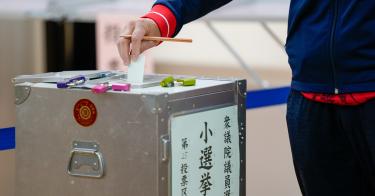Japan’s ruling Liberal Democratic Party came away from Halloween with an unexpected treat. All 465 seats of the House of Representatives were up for grabs in Sunday’s elections, and predictions for the LDP were frightening. But the party lost only a handful of seats. Prime Minister Fumio Kishida is now in a strong position to pursue tougher policies against threats from China and North Korea.
Even Mr. Kishida had been lowering expectations to suggest the ruling coalition may retain only a simple majority. Other experts predicted the loss of the majority and the end of Mr. Kishida’s tenure as prime minister. There was good reason for the pessimism. The usually splintered opposition parties worked together to a greater degree than in previous elections. The main opposition, the Constitutional Democratic Party of Japan, was expected to gain seats; instead, it lost 13.
Meanwhile, the LDP lost only 15 seats, holding a simple majority on its own. Thanks to wins from its partner Komeito, the coalition emerged with a stable majority of 293. The ruling parties can thus continue to move legislation. Some watching the election worried that if the LDP took heavy losses, the party would have to rely more on its pacifist allies in Komeito, putting any serious effort to counter China on the back burner.
But the surprisingly strong showing Sunday demolished those predictions. Mr. Kishida can also maintain Tokyo’s firm stance against North Korea’s nuclear and missile threats as well as its repeated violations of United Nations resolutions.
Mr. Kishida has said that Japan’s “top priority” is countering Beijing, and expressed concerns about China’s growing military strength. In a September interview with this newspaper, he rightly styled Taiwan as “the front line” in the clash between authoritarianism and democracy.
One good idea: Mr. Kishida has suggested that Tokyo and Washington run joint crisis simulations to prepare for scenarios that could threaten Taiwan. In recent months, senior Japanese policy makers have more forthrightly criticized Beijing’s intimidation tactics against Taiwan. In June, Defense Minister Nobuo Kishi declared that the security of Taiwan was directly linked with that of Japan. In July, Deputy Prime Minister Taro Aso asserted that a Chinese invasion would be an “existential threat” to Japan since “Okinawa could be next.”
The LDP has floated doubling the defense budget to 2% of GDP, though such a large boost is unlikely. Yet Japan is pondering a buildup in missile-strike capability. This would be a welcome development, shoring up the U.S. military in the region and encouraging other American allies to share the burden of security.
Mr. Kishida is expected to retain Prime Minister Shinzo Abe’s visionary policies under the banner of upholding a “Free and Open Indo-Pacific,” including elevating Japan’s diplomatic, economic and security ties with Southeast Asian nations and increasing participation in regional military exercises. On diplomacy, he says he’ll work to strengthen the Quadrilateral Security Dialogue among Japan, the U.S., Australia and India.
Whether Mr. Kishida can deliver is uncertain. He faces political, budgetary and diplomatic hurdles, and Tokyo’s decision-making process can be slow. But minimizing LDP losses in this weekend’s election was an impressive feat.
As Mr. Kishida gets working on the project, he has expressed an interest in a summit with President Biden. Washington should try to make it happen. A summit would give the U.S. a powerful public forum to affirm its support for Japan, an essential partner in checking the looming threat of China.
This piece originally appeared in The Wall Street Journal on 11/3/21



